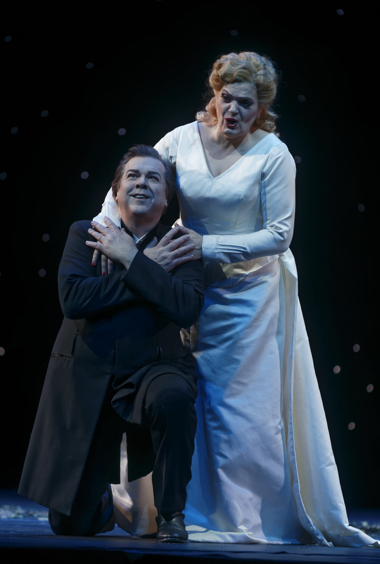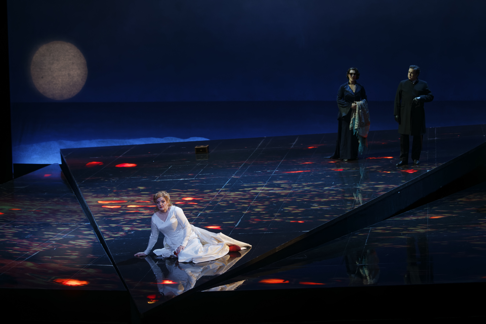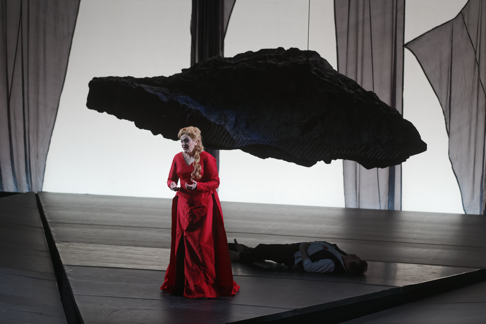
06 Feb 2015
Tristan et Isolde in Toulouse
Tristan first appeared on the stage of the Théâtre du Capitole in 1928, sung in French, the same language that served its 1942 production even with Wehrmacht tanks parked in front of the opera house.
English Touring Opera are delighted to announce a season of lyric monodramas to tour nationally from October to December. The season features music for solo singer and piano by Argento, Britten, Tippett and Shostakovich with a bold and inventive approach to making opera during social distancing.
This tenth of ten Live from London concerts was in fact a recorded live performance from California. It was no less enjoyable for that, and it was also uplifting to learn that this wasn’t in fact the ‘last’ LfL event that we will be able to enjoy, courtesy of VOCES8 and their fellow vocal ensembles (more below …).
Ever since Wigmore Hall announced their superb series of autumn concerts, all streamed live and available free of charge, I’d been looking forward to this song recital by Ian Bostridge and Imogen Cooper.
Although Stile Antico’s programme article for their Live from London recital introduced their selection from the many treasures of the English Renaissance in the context of the theological debates and upheavals of the Tudor and Elizabethan years, their performance was more evocative of private chamber music than of public liturgy.
Evidently, face masks don’t stifle appreciative “Bravo!”s. And, reducing audience numbers doesn’t lower the volume of such acclamations. For, the audience at Wigmore Hall gave soprano Elizabeth Llewellyn and pianist Simon Lepper a greatly deserved warm reception and hearty response following this lunchtime recital of late-Romantic song.
For this week’s Live from London vocal recital we moved from the home of VOCES8, St Anne and St Agnes in the City of London, to Kings Place, where The Sixteen - who have been associate artists at the venue for some time - presented a programme of music and words bound together by the theme of ‘reflection’.
'Such is your divine Disposation that both you excellently understand, and royally entertaine the Exercise of Musicke.’
‘And there was war in heaven: Michael and his angels fought against the dragon; and the dragon fought and his angels, And prevailed not; neither was their place found any more in heaven … that old serpent … Satan, which deceiveth the whole world: he was cast out into the earth, and his angels were cast out with him.’
There was never any doubt that the fifth of the twelve Met Stars Live in Concert broadcasts was going to be a palpably intense and vivid event, as well as a musically stunning and theatrically enervating experience.
‘Love’ was the theme for this Live from London performance by Apollo5. Given the complexity and diversity of that human emotion, and Apollo5’s reputation for versatility and diverse repertoire, ranging from Renaissance choral music to jazz, from contemporary classical works to popular song, it was no surprise that their programme spanned 500 years and several musical styles.
The Academy of St Martin in the Fields have titled their autumn series of eight concerts - which are taking place at 5pm and 7.30pm on two Saturdays each month at their home venue in Trafalgar Square, and being filmed for streaming the following Thursday - ‘re:connect’.
The London Symphony Orchestra opened their Autumn 2020 season with a homage to Oliver Knussen, who died at the age of 66 in July 2018. The programme traced a national musical lineage through the twentieth century, from Britten to Knussen, on to Mark-Anthony Turnage, and entwining the LSO and Rattle too.
With the Live from London digital vocal festival entering the second half of the series, the festival’s host, VOCES8, returned to their home at St Annes and St Agnes in the City of London to present a sequence of ‘Choral Dances’ - vocal music inspired by dance, embracing diverse genres from the Renaissance madrigal to swing jazz.
Just a few unison string wriggles from the opening of Mozart’s overture to Le nozze di Figaro are enough to make any opera-lover perch on the edge of their seat, in excited anticipation of the drama in music to come, so there could be no other curtain-raiser for this Gala Concert at the Royal Opera House, the latest instalment from ‘their House’ to ‘our houses’.
"Before the ending of the day, creator of all things, we pray that, with your accustomed mercy, you may watch over us."
The doors at The Metropolitan Opera will not open to live audiences until 2021 at the earliest, and the likelihood of normal operatic life resuming in cities around the world looks but a distant dream at present. But, while we may not be invited from our homes into the opera house for some time yet, with its free daily screenings of past productions and its pay-per-view Met Stars Live in Concert series, the Met continues to bring opera into our homes.
Music-making at this year’s Grange Festival Opera may have fallen silent in June and July, but the country house and extensive grounds of The Grange provided an ideal setting for a weekend of twelve specially conceived ‘promenade’ performances encompassing music and dance.
There’s a “slide of harmony” and “all the bones leave your body at that moment and you collapse to the floor, it’s so extraordinary.”
“Music for a while, shall all your cares beguile.”
The hum of bees rising from myriad scented blooms; gentle strains of birdsong; the cheerful chatter of picnickers beside a still lake; decorous thwacks of leather on willow; song and music floating through the warm evening air.

Tristan first appeared on the stage of the Théâtre du Capitole in 1928, sung in French, the same language that served its 1942 production even with Wehrmacht tanks parked in front of the opera house.
But ten years later, 1952, Kirsten Flagstad sang Isolde in Toulouse, in German of course. The then director of the opera, tenor Louis Izar was a celebrated Ring Mime, and the then mayor of Toulouse, Raymond Badiou himself was big friends with Wieland Wagner. Toulouse had become known as Bayreuth-sur-Garonne (the river that passes through Toulouse).
Tristan und Isolde however disappeared from the Theatre du Capitole after the 1972 production (Herbert Becker and Klara Barlow), not to reappear until 2007 in a production by Nicholas Joël, remounted just now with American tenor Robert Dean Smith as Tristan and Portuguese soprano Elisabete Matos as Isolde. At the first intermission a tall gentleman strode through the bar loudly proclaiming in hoch British that it was “better than Bayreuth.”
 Elisabete Matos as Isolde
Elisabete Matos as Isolde
Most of us have not been to Bayreuth so we cannot know, but it was indeed certain that this Tristan was already an ultimate experience, and that was well before the Tristan delirium that was the musically shattering climax of the performance. The conductor was 62 year old, Leipzig born conductor Claus Peter Flor, known in the U.S. as the guest conductor of the Dallas Symphony (1999-2008). While no stranger to the opera pit his program booklet biography reveals him to be primarily an orchestral conductor.
The maestro concentrated his attention on the famed Toulouse orchestra, here strings 12/12/10/8/6, triple winds but 6 horns, with the full backstage complement of 6 horns and 3 each trumpets and trombones. There were two harps for the mesmerizingly beautiful second act love tryst, Brangäne gorgeously intoning her admonitions. The exquisite minor third trills of the clarinets had already laid the foundations for Wagner’s eternally quivering passions.
If seventy six orchestra players and two heroic voices can be said to whisper this was the intimacy of the second act. In fact the first act as well was developed in personal rather than mythical voices, the oboes, flutes and English horn working to color Isolde’s despair, Brangäne’s (in black spectacles) deception, and Tristan’s indifference. The first act love duet was surprise more than passion, preparing us for the musico-psychological treatise on nineteenth Romantic century love that was the second and third acts.
Metteur en scène Nicholas Joël hovered between the real and the magical, his production sometimes staged and sometimes semi-staged. Wagner’s first act sailors were 8 supernumeraries [figurants] (the chorus was hidden) in formal concert dress (tails) who reappeared at the end of the opera as King Mark’s soldiers. The second act swords drawn, Melot’s thrust was symbolically received, Tristan fell, isolated on the other side of the stage. At the end of the opera Kurvenal’s thrust was symbolic, not actually touching the jealous traitor, Tristan’s friend Melot.
 Elisabete Matos as Isolde, Robert Dean Smith as Tristan
Elisabete Matos as Isolde, Robert Dean Smith as Tristan
Finally Tristan lying dead, Isolde rose, walked down stage center (the soldiers, the dead Kurvenal and Melot as well as King Mark had all slipped off stage). This was the liebestod for the brilliant-red gowned Isolde, in concert now. It was, as intended, a panegyric to love. It was not the end of an opera.
The coup de théâtre occurred at the beginning of the third act. The curtain rose on the wounded Tristan hanging over the front point of the now sharply elevated triangular center platform (the stage set was three platforms that in the first act had moved up and down as the wave motions of the sea). Arms and head dangling into the emptiness high above the orchestra pit Tristan remained there for maybe ten minutes (through the English horn solo and Kurvenal’s scene with the shepherd).
He awoke to deliver his great mad scene, always perched on this point, and somehow balanced philosophy with emotional rawness, rationality with irrationality. It was in this delirium that the maestro let loose with the great (and here the biggest) orchestral climaxes of the entire opera. It was the cerebral drama of this extended tract that made the Joël concept of Tristan become the masterpiece Tristan und Isolde is said to be — we both understood and felt love as if we were a Romantic poet.
Robert Dean Smith is of strong, secure and virile voice, his dramatic and musical intelligence apparent, well able to effect the considerable challenges of this mise en scène. He has already established himself as one of the important Tristans of our day on the world’s important stages. Elisabete Matos has performed Isolde once before, in 2011 at Barcelona’s Liceu. In the prime of voice she is able to soar to and beyond the enormous climaxes never compromising her richly colored sound. Her familiarity with the great Verdi dramatic soprano roles lies under her Isolde, the liebestod far more intimate and personal than heroic. The vast emotional vistas and philosophic scope of this production were perfectly realized in her performance.
German mezzo-soprano Daniela Sindram well fulfilled the requirements of this production, her Brangäne a very present figure in Wagner’s conceptual preparations. Costumed in white German baritone Stefan Heidemann made a very present Kurvenal, his rather loud, darkly colored voice a welcomed contrast to the refined Heldon tenor tone of Robert Dean Smith. German bass Hans-Peter König was a perfunctory King Mark.
Conductor Claus Peter Flor created this remarkable musical vision that fulfilled the complex theatrical vision of Nicholas Joël. The stage and pit were remarkably synchronized, the maestro focused on his orchestra, the stage very sure of itself.
Michael Milenski
Casts and production information:
Tristan: Robert Dean Smith; Isolde: Elisabete Matos; King Mark: Hans-Peter Koenig; Kurwenal: Stefan Heidemann; Melot: Thomas Dolié; Brangaene: Daniela Sindram; Un Jeune matelot / Un Berger: Paul Kaufmann; Un Pilote: Jean-Luc Antoine. Choeur du Capitole, Orchestre national du Capitole. Conductor: Claus Peter Flor; Mise en scène: Nicolas Joel; Scenery and costumes: Andreas Reinhardt; Lighting: Vinicio Cheli. Théâtre du Capitole, Toulouse, February 1, 2015.